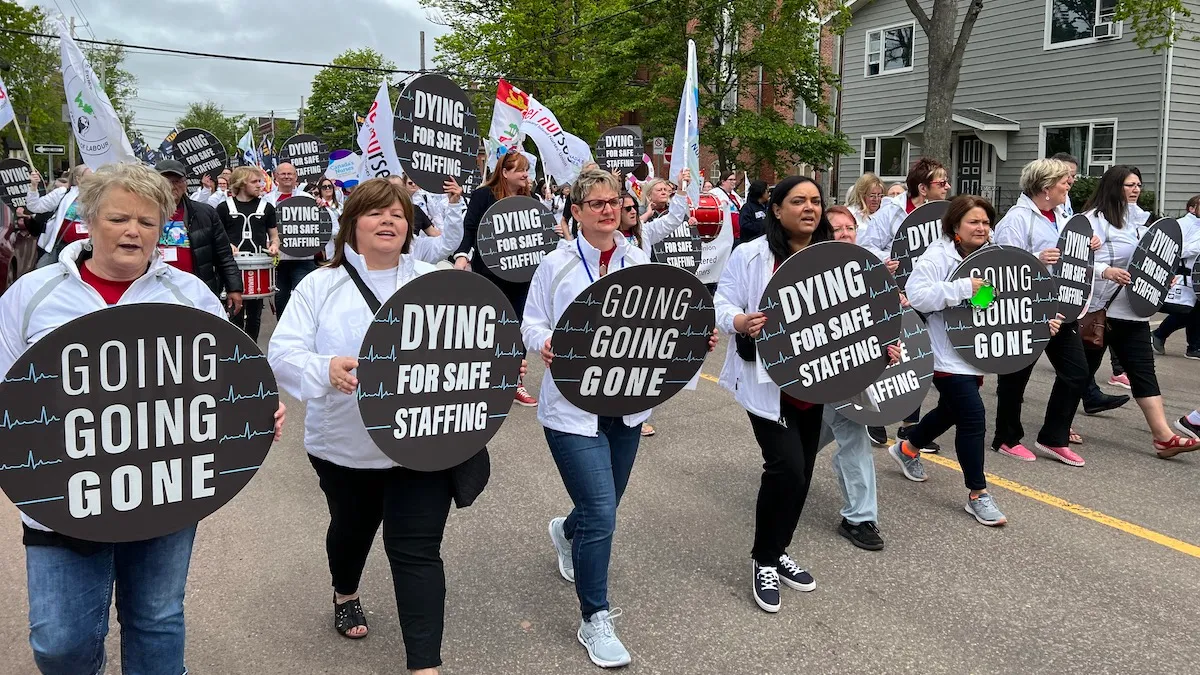Spending on so-called “agency nurses,” nurses employed by for-profit nursing agencies whose services are contracted out to short-staffed public health care employers to fill temporary staffing needs, is out of control and expected to surpass $1.5 billion in Canada in the current fiscal year.
That’s not a typo. That’s billion with a B – as in $1,500,000,000 – according to a new study released by the Canadian Federation of Nurses Unions (CFNU) on spending in Canada on agency nurses, also commonly known as travel nurses.
This troubling development is relatively new, the report by Queen’s University nursing professor Dr. Joan Almost points out – it represents a six-fold increase over only three years, shooting up from $247.9 million in 2020-2021.
Incomplete data from available sources shows spending on nursing agencies was at least $717.2 million in 2021-2022, and $1.2 billion in the 2022-2023 fiscal year, the report says. Dr. Almost, who is also a Registered Nurse, was unsurprisingly forced to rely on media stories and auditor general reports for much of the information she could get from some provinces, including Alberta.
In addition to long-term care facilities, the impact of this expensive reliance on agency nurses is felt most heavily in critical care units, emergency departments, and hospital medical units, Dr. Almost’s report says. It also hits rural hospitals hard.
The study projects that nearly 7.3 million agency nurse hours will be used in the 2023-2024 fiscal year in the seven provinces and territories where data was available. The report – entitled Opening the black box: Unpacking the use of nursing agencies in Canada – concludes that is the equivalent of 3,724 full-time nursing positions in Canadian communities. The true number is almost certainly higher.
Since the burgeoning nursing agency industry is virtually unregulated, there is almost no accountability for this vast spending on the more than 470 for-profit nursing agencies now operating in Canada – a number that is likely to continue to grow as public health employers are forced to rely even more on agency nurses to keep their wards operating.
Naturally, the private-sector companies profiting from this situation like it that way, and right-wing governments like the United Conservative Party in Alberta surely do too. It’s one way Canada’s health care system is being privatized by stealth.
The sudden and cripplingly expensive growth of nursing agencies comes against the backdrop of the aftermath of the COVID-19 pandemic, persistent disrespect of professional nurses in all designations by governments and employers, long hours, mandatory overtime, and pay that is not keeping up with inflation – factors that are all contributing to critical staffing shortages as nurses retire early, leave the profession, or switch to agency employment for higher salaries and more control over their lives.
Just how high those salaries are can be hard to pin down, because private companies are not accountable to the public, but anecdotal reports tell of employers being charged up to $300 per hour for nurses in hospital settings – not all of which, of course, goes to the agency nurse.
“While nursing shortages and deteriorating working conditions predate the pandemic, a tsunami has taken place across the country with many nurses deciding that they have had enough, spurring them to retire early, leave the public system, or leave the profession,” the report says.
Nursing agencies have been around for decades and serve a necessary role in the health care system, the report notes, but they “were never intended to fill a chronic nationwide full‐time nursing staff shortage, and the system cannot continue to accommodate this spending.”
So we now have a system in which employers plead poverty to keep staff nursing wages low while they are forced to pay far more to nursing agencies for staff they can no longer operate without.
Employers find themselves dealing with unexpected rate hikes by agencies and having to decide whether to pay up, leave units inadequately staffed, or cancel services, the report notes.
This heavy reliance on nursing agencies has undermined federal, provincial and territorial efforts to recruit and retain nurses throughout Canada, it says.
“While governments, employers and unions have been working to fix workplaces and solve the health care crisis, corporate stakeholders have been taking advantage of the hardship facing our health care system,” CFNU President Linda Silas said in a news release this morning. “We can’t allow this profiteering of the health care crisis to continue.”
Dr. Almost’s report recommends several responses to the heavy reliance on nursing agencies, and its harmful impact on health care costs, accountability and the growing staffing crisis, among them:
- Require public sector employers to publish and implement strategies to phase out use of agencies
- Establish government-run or non-profit services to provide temporary nurses and take the profit out of nurse staffing
- Have provincial and federal auditors general formally investigate of the costs of using nursing agencies
- Require public reporting by public health care employers of their use of agency nursing services and its cost, “adhering to a minimum data standard”
- Implement standardized procedures for procuring agency services that limit allowable costs and terms.



